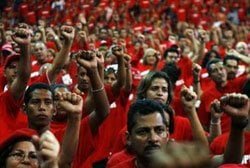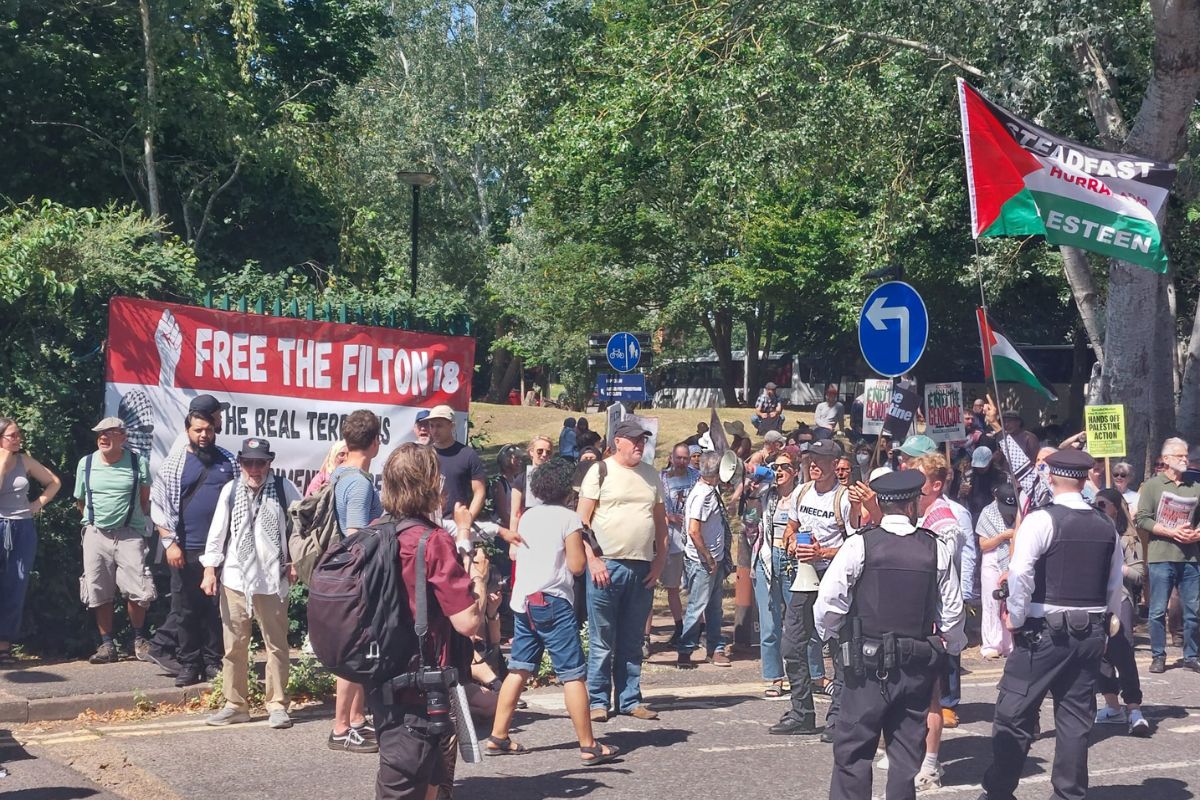Successful First Hands off Venezuela meeting in Norwich city centre – Thursday 13th march
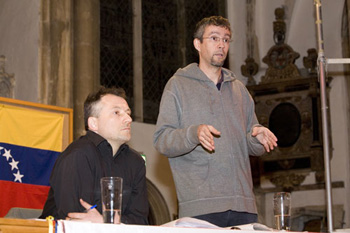 |
| Jorge Martin |
After the PSUV founding congress, the Venezuelan revolution
is back on the agenda. This is even more important than ever considering the
current world economic turmoil and the uncertainty surrounding Cuba’s future
since Castro announced he was not standing for president.
With this exciting backdrop, Jorge Martin, international
secretary of the Hands off Venezuela campaign, spoke in Norwich city centre on the topic Cuba and
the Bolivarian Revolution. We in Norwich considered ourselves extremely
fortunate to host Jorge on this topic,as not only is it big news in the labour
movement (and the country as a whole), but Jorge has only just returned from
Cuba, being there during Castro’s announcement.
This, and our recent passing of a motion of affiliation to Hands
off Venezuela at UEA, was the perfect backdrop for our first meeting in Norwich city centre. In
organising this meeting, we have been working closely with some members of an
independent Venezuela
solidarity group in Norwich.
Our combined efforts drew a crowd of 60, many of whom we had never seen before
at meetings.
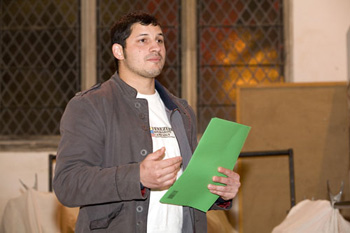
Jorge spoke for over 30 minutes, mainly outlining the
situation in Cuba: the
spirited popular defence of the gains of the revolution, but also the constant
undermining of these gains through the loss of its relationship with the USSR, the
economic embargo and the relentless pressures of the world market. Jorge
explained that in seeking a way out of this crisis, 80-90% of Cubans reject the
idea of capitalism. However, the ‘Chinese way’, which is really more or less
disguised capitalism, holds a certain attractive pull because of its economic
boom, amongst a section in the leadership. But Jorge warned against this
illusion – China is not a model of socialism, but rather capitalism, and has
only been able to achieve such growth because of its enormous size, and
nevertheless remains at the whim of the world market, a world market now on the
verge of recession.
He finished off his speech in reference to Venezuela, speaking of its rejuvenating effect
all over Latin America, and that we ourselves must learn a thing or two from
the revolutionary movements in Latin America,
as they represent the only possible future for humanity.
Jorge’s speech received possibly the warmest response from
any meeting we have held here. The discussion lasted another 30 minutes, with
contributions and questions on the future leadership of the Latin American left
post Castro, the PSUV congress, Cuba’s level of democracy in comparison to
Britain’s, and the recent situation with Colombian and US imperialism.
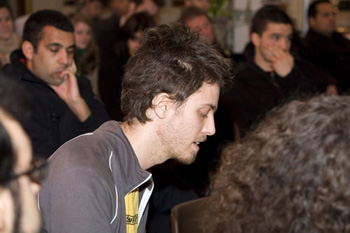 One of the advantages in holding meetings in town is that
One of the advantages in holding meetings in town is that
most of your audience are not students, and have some money to donate! When we
hold meetings on campus, even big ones, we often struggle to pay the speaker’s
expenses. But tonight we were able to not only cover these costs but also pay
for the venue, as well as selling a good amount of literature and DVDs.
Following the meeting quite a crowd headed down to the pub
to discuss further. There is now the possibility of working closer on the
independent Venezuela
solidarity group, and to follow up this meeting in town with more in order to
build on our contacts. What is certain is that following our successful motion
to affiliate UEA students union with Hands off Venezuela, the campaign
here will not go away.
Joint meeting against imperialist intervention in Latin America – Saturday 15th March

A successful public meeting on the Latin American
Revolution, organised jointly by four solidarity campaigns, was held in
Central London following the Stop the War rally on Saturday
15 March.
The meeting had been called by Hands Off Venezuela, Colombia
Solidarity Campaign, the Movement of Ecuadorians in the UK and the Bolivia Solidarity Campaign, as a
response to the military incursion launched by the Uribe government of Colombia against Ecuador and the renewed threat of
imperialism.
About 70 people packed the meeting room and heard speakers
from the different campaigns describe how the struggle of workers and peasants
in Latin America for a better society is
opposed fiercely by imperialism and the few hundred wealthy families who
control the economy and dominate the privately-owned media in these countries.
 |
| Fidel from Movimiento Ecuador Reino Unido (Movement of Ecuadoreans in the UK) |
Fidel from Movimiento Ecuador Reino Unido (Movement of
Ecuadoreans in the UK) explained how the people of Ecuador are very good at
said at getting rid of bad presidents, but up until now have not been very good
at getting a good one in. He explained the different steps through which Rafael
Correa came to power against the opposition of all traditional parties, the oligarchy
and the media.
Jorge Martin from Hands Off Venezuela, explained the latest
threats of imperialism against the Bolivarian revolution: Exxon’s legal case
against PDVSA, the attempt by Bush to list Venezuela as a "terrorist" country
and the on-going campaign of sabotage of the economy on the part of the
oligarchy. He also made an appraisal of the recent congress of the newly formed
PSUV, in which the revolutionary democratic spirit of the Bolivarian rank and
file had made itself heard loudly, despite attempts of the bureaucracy to
silence it. He warned that the 100 families which compose the oligarchy have
largely lost political power but still have economic power. The other danger
which faces the revolution, he said, is the internal bureaucracy and the right
wing of the Bolivarian movement who block the revolutionary initiative of the
people and many times the rulings of the president himself.
Andy Higginbottom and Juan Gabriel from the Colombia
Solidarity Campaign spoke next. Andy started by explaining how two activists
had been detained by the police during the Stop the War demo just for chalking
slogans on a building. He then went on to explain that the right wing
government of Uribe in Colombia
was groomed as imperialism’s staunchest ally. Uribe himself was educated in
Harvard and Oxford.
Juan Gabriel gave a detailed explanation of the mood of fear and intimidation
which prevails in Colombia
against any form of left wing activity. He gave examples of how bosses gave
their workers time off to attend the February 4th demonstrations
against the FARC organised by the government and the right wing, while 4 of the
organisers of the March 6th demonstrations against paramilitarism
and violence had been shot dead.
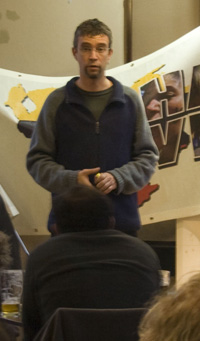 |
| Jorge Martin from Hands Off Venezuela |
Amancay Colque from Bolivia Solidarity Campaign also spoke
explaining how the issue of "autonomy" which had been raised in Santa Cruz and other
provinces was used by the right wing in order to undermine the Evo Morales
government but above all to keep control over the rich gas and oil fields in
this region. She also explained the limitations of the Constituent Assembly and
how the oligarchy used also the issue of the capital city to divert attention
from the main point which was land reform.
During the discussion a number of very good points were made.
For instance the issue of coal mining in Zulia, which would negatively impact
the livelihoods of indigenous communities was one which showed the
contradiction between Chavez and the bureaucrats on the ground which had links
with the coal multinationals. In response to this Jorge Martin also mentioned
the SIDOR steel workers strike which had been repressed by the National Guard.
There was also discussion about the issue of
narco-trafficking which Andy Higginbottom explained is clearly linked to the interests
of the ruling class in Colombia.
A common thread of the discussion was that we should not forget that the
multinationals which are exploiting these countries are based in Europe and the
US,
so it was not just solidarity which was required but also a struggle against
the system that creates these conditions. Jorge Martin made the point that the
struggle for socialism should not only take place in Latin America but also in Britain.
At the end a collection was made that covered cost of the
meeting room. There was a general feeling that the meeting had been a good example of cooperation between the
different solidarity campaigns, something that needed to continue in the
future.
 |
| Andy Higginbottom from the Colombia Solidarity Campaign |
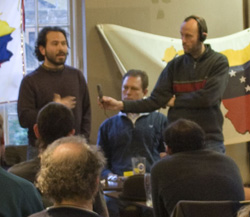 |
| Juan Gabriel from the Colombia Solidarity Campaign |
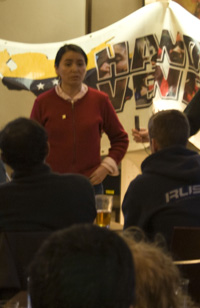 |
| Amancay Colque from Bolivia Solidarity Campaign |
Listen to the Audio files of the meeting:
Ecuador: Fidel
Venezuela: Jorge Martin
Colombia: Andy and Juan
Bolivia: Amancay Colque
Discussion
Links to the other campaigns:
Movimiento Ecuador Reino Unido (Movement of Ecuadoreans in the UK)
Colombia Solidarity Campaign
Bolivia Solidarity Campaign

